Key takeaways:
- Editing is crucial for enhancing clarity and impact, requiring a balance of ruthlessness and compassion in decision-making.
- Establishing a structured revision process and incorporating feedback from peers can significantly improve editing skills.
- Practicing various editing styles, including minimalist and genre-specific approaches, helps expand the emotional depth and versatility of writing.
- Tracking progress through reflection on past work fosters growth and boosts confidence in editing abilities.
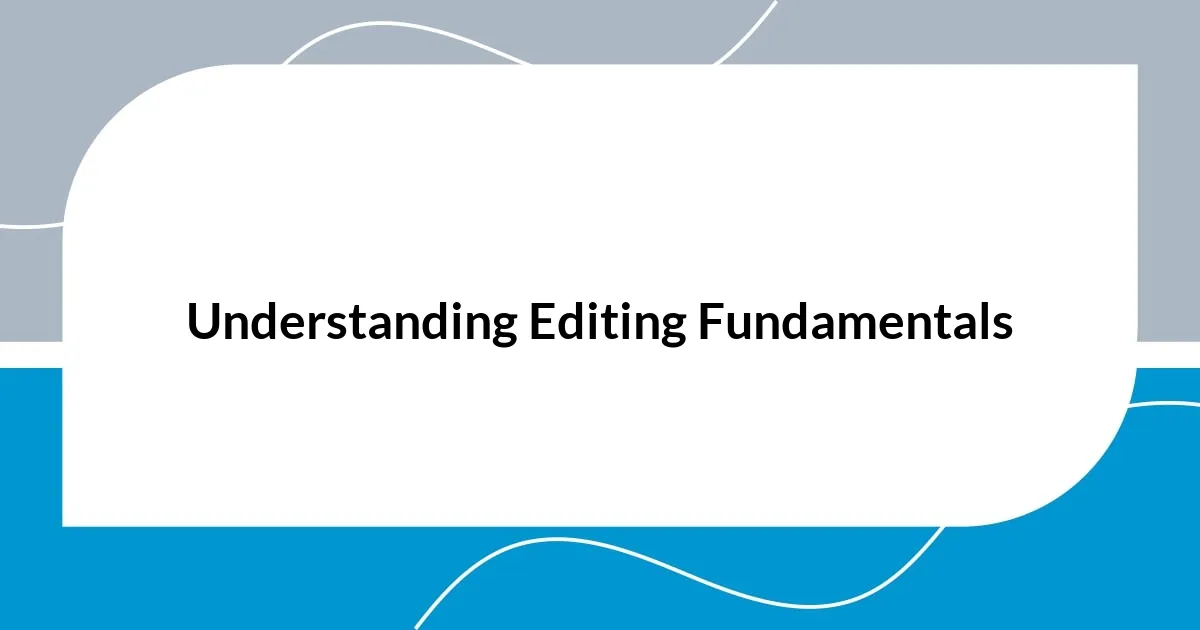
Understanding Editing Fundamentals
Editing is much more than just correcting grammar and punctuation; it’s about honing the overall clarity and impact of a piece. I remember the first time I delved deep into an article I’d written, removing sections that felt redundant but were difficult to part with. That uncomfortable feeling? It’s a vital part of the editing journey, signaling growth as a writer.
One fundamental concept I learned early on is the importance of structure. I once struggled with an article that rambled without a clear focus. I realized that editing often requires a fresh perspective—putting myself in the shoes of my readers. Would they find the flow logical? Would they engage with the content? That inquiry changed my approach and helped refine my narrative.
Moreover, editing teaches us to be ruthless yet compassionate in our choices. When I decided to cut a beloved paragraph that I thought added charm but didn’t serve the main message, it felt like a breakup! But ultimately, the piece became more powerful. Isn’t it fascinating how such decisions shape our writing? Editing is not only a skill; it’s a profound way of respecting both our work and our audience.
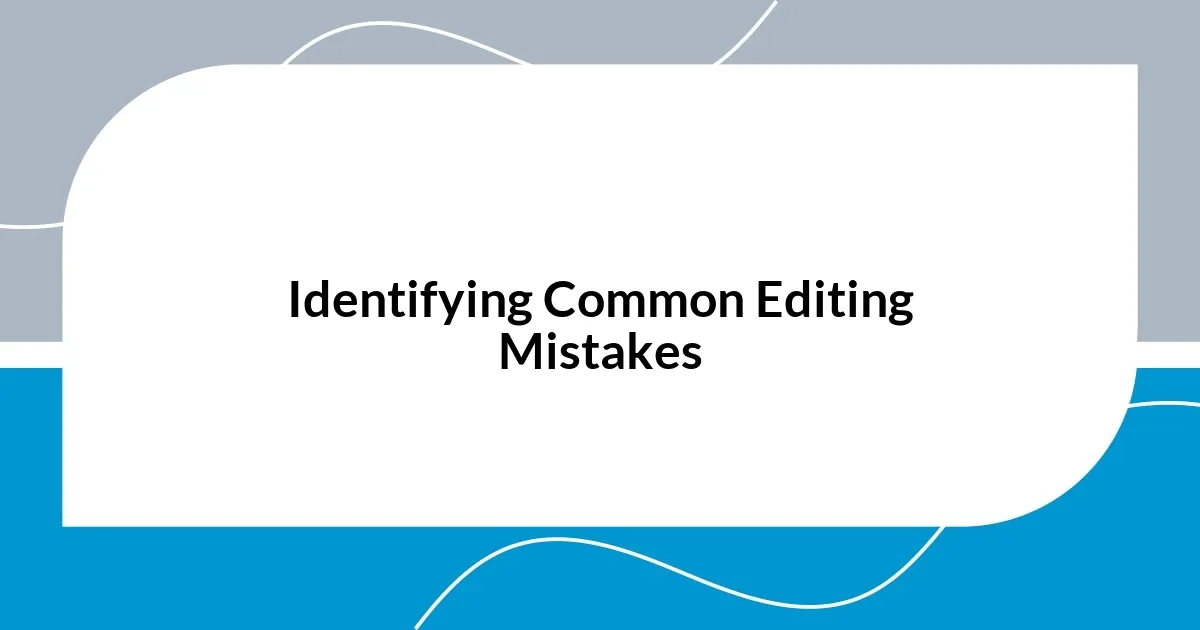
Identifying Common Editing Mistakes
Identifying common editing mistakes can be a real eye-opener for a writer. In my early days, I often overlooked things like consistency in tone and voice. I remember proofreading a piece where my excitement about a topic clashed with the mature tone expected for the audience. It was jarring! I learned the hard way that keeping a consistent tone enhances readability and keeps your audience engaged.
Here are some frequent editing pitfalls to watch for:
- Overusing Adjectives: I used to sprinkle adjectives like confetti, thinking they added flair. Instead, they cluttered my writing.
- Inconsistencies: I once mixed tenses within the same paragraph, which left my readers confused about the timeline.
- Lack of Clarity: I remember a sentence I thought was clever, but feedback revealed that it made readers pause rather than nod in understanding.
- Ignoring Repetition: I used the word “incredible” multiple times within a short section. It embarrassed me to realize that it diminished the impact of the word.
- Neglecting Sentence Variety: My earlier drafts had a monotonous rhythm—short, choppy sentences that became tedious to read.
This journey has taught me that recognizing and correcting these mistakes is essential for honing my editing skills and ultimately creating more compelling content. It’s a constant learning process, asking myself whether each edit enhances or obscures my message.
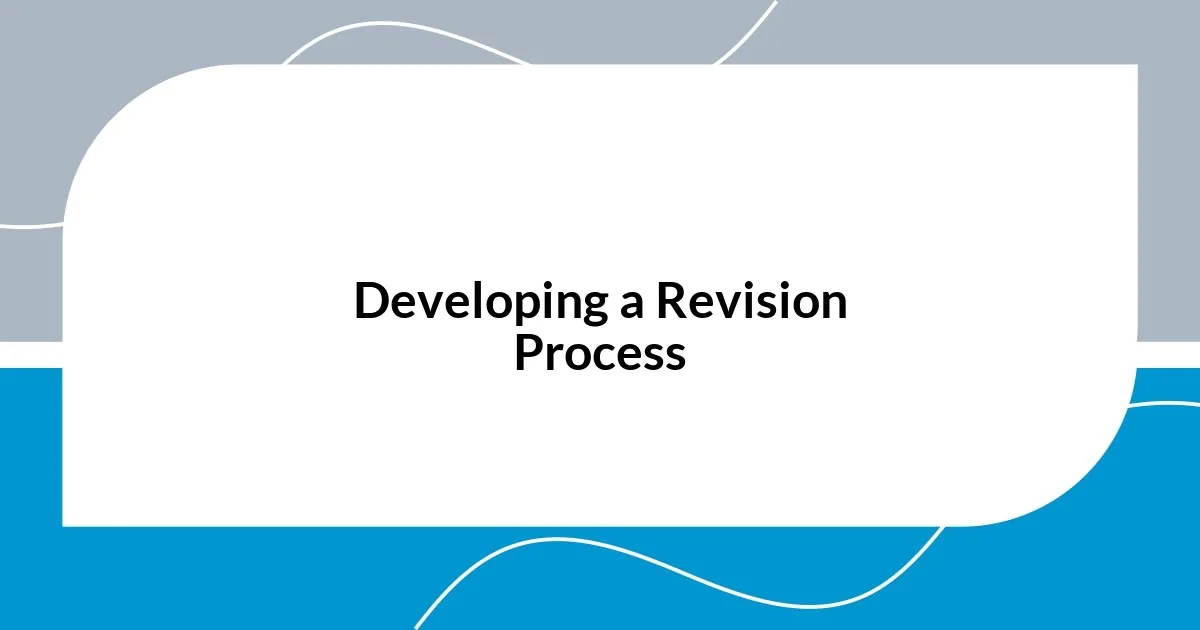
Developing a Revision Process
Developing a revision process has been a game-changer for my editing skills. Initially, I would dive straight into corrections without taking a moment to breathe. But I soon realized the value of creating a structured approach. For instance, I dedicated specific days each week for revising different elements of my writing: one day for content flow, another for grammar, and yet another for clarity. This not only made the process less overwhelming but also allowed me to focus intently on one aspect at a time. It’s almost like wearing different hats, and each hat helps me see my work from a new perspective.
Over time, I have found it incredibly helpful to incorporate feedback into my revision process. I remember when I shared a draft with a peer for the first time. Their insights revealed nuances I hadn’t even considered. I’ve learned to welcome constructive criticism as a valuable tool rather than a personal affront. It feels rewarding to reshape my writing based on someone else’s fresh eyes, making it a collaborative effort that enriches my work.
Lastly, setting goals for each revision round has significantly sharpened my process. At the beginning of each revision, I ask myself what I want to accomplish. Is it tightening the narrative, enhancing character development, or boosting overall clarity? This focused approach has helped me stay on track and not get scooped into the mundane details. It’s like having a map in my hand; I’m no longer wandering aimlessly but progressing with intention.
| Element | Description |
|---|---|
| Structured Days | Allocate specific days for different revision focuses, allowing for deeper engagement. |
| Incorporating Feedback | Use peer insights as a means to expand perspectives and improve drafts. |
| Setting Goals | Establish clear objectives for each editing round to provide direction. |
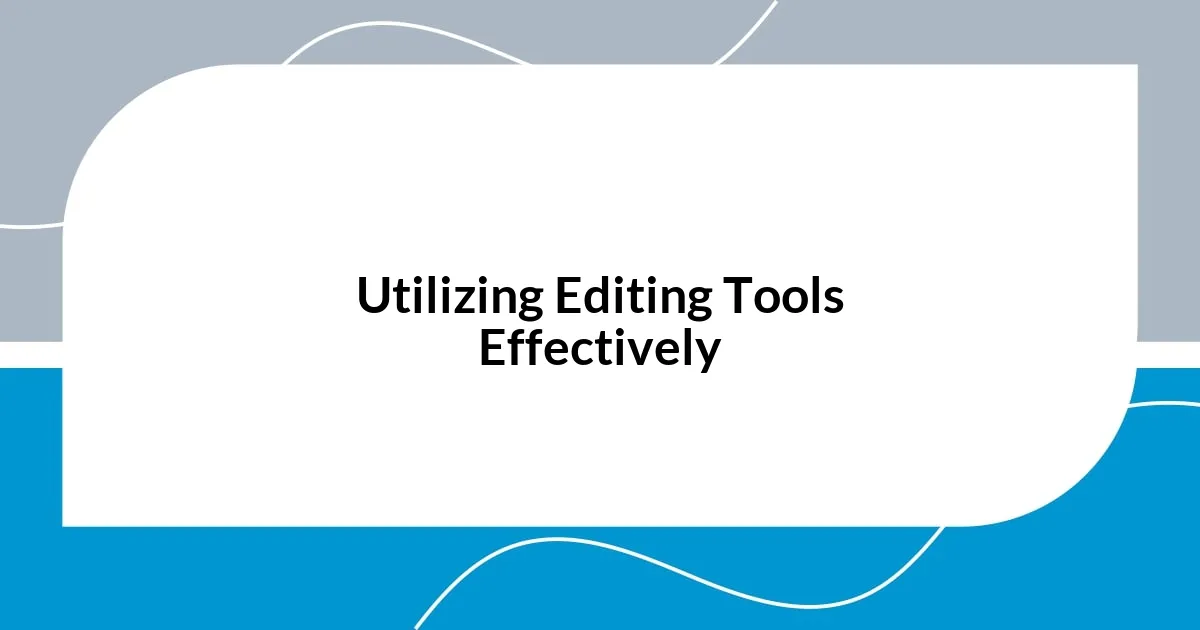
Utilizing Editing Tools Effectively
One of the most significant steps in enhancing my editing skills was discovering the treasure trove of editing tools available today. When I first stumbled upon grammar checkers and style enhancement software, I was amazed at how these tools could catch errors I’d missed. I remember uploading a piece I was proud of, only to have an editor tool flag sentences that lacked clarity or were overly complex. It felt like a humbling lesson, but I embraced it as an opportunity to learn and improve.
Beyond standard editing software, I’ve found tools that streamline my workflow fascinating. For example, I began using distraction-free writing apps. It seems simple, but eliminating pop-up notifications and cluttered interfaces made a world of difference. Suddenly, I could genuinely immerse myself in the editing process. Have you ever tried writing without distractions? It might just unlock that sharper focus you need!
Another method I turned to was the use of collaborative platforms. Sharing my work online and getting immediate feedback opened my eyes to different styles and approaches. I recall uploading a draft to a writer’s group and receiving insightful suggestions that initially made me uncomfortable. However, those perspectives enriched my editing skills immeasurably. It was like adding new shades of color to my palette—I could edit with more depth and nuance than I thought possible. Embracing these editing tools has transformed my writing process, making it not only more efficient but also infinitely more rewarding.
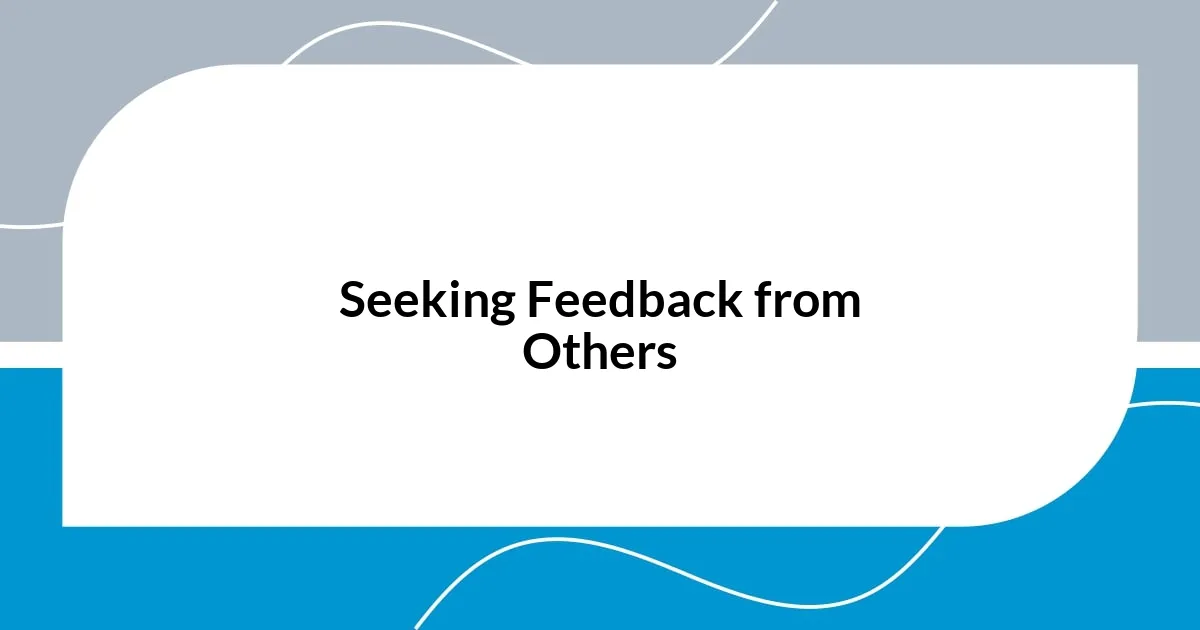
Seeking Feedback from Others
Getting feedback from others has been a transformative part of my journey in honing my editing skills. I’ve often sought opinions from friends or fellow writers, even when I hesitated to share my work. One memorable instance was when I nervously shared an early draft with a trusted colleague. Their feedback illuminated areas I hadn’t even been aware of, which truly changed my perspective. It made me realize that fresh eyes could spot mistakes and opportunities for improvement that I was blind to.
The emotional rollercoaster of receiving feedback can be intense—it’s that mix of vulnerability and excitement. When I first started accepting critiques, I often felt defensive. However, I soon learned to embrace feedback as a gift. The next time I presented a piece and was met with constructive criticism, I took a deep breath and instead of bristling at the comments, I asked questions. How can I improve this? What did you see that I missed? Those discussions not only refined my work but also helped me build connections with other writers.
In my experience, seeking feedback isn’t just about polishing a draft; it also fosters growth. Have you ever found yourself stuck in a creative rut? I remember one particularly frustrating week where I felt like my writing had hit a wall. After sharing my struggles with a fellow editor, their insights sparked ideas I hadn’t considered. It was a reminder that collaboration can reignite our creative flames and lead to breakthroughs we couldn’t achieve alone. So, don’t shy away from seeking out feedback—sometimes, it’s the very thing that propels you forward.
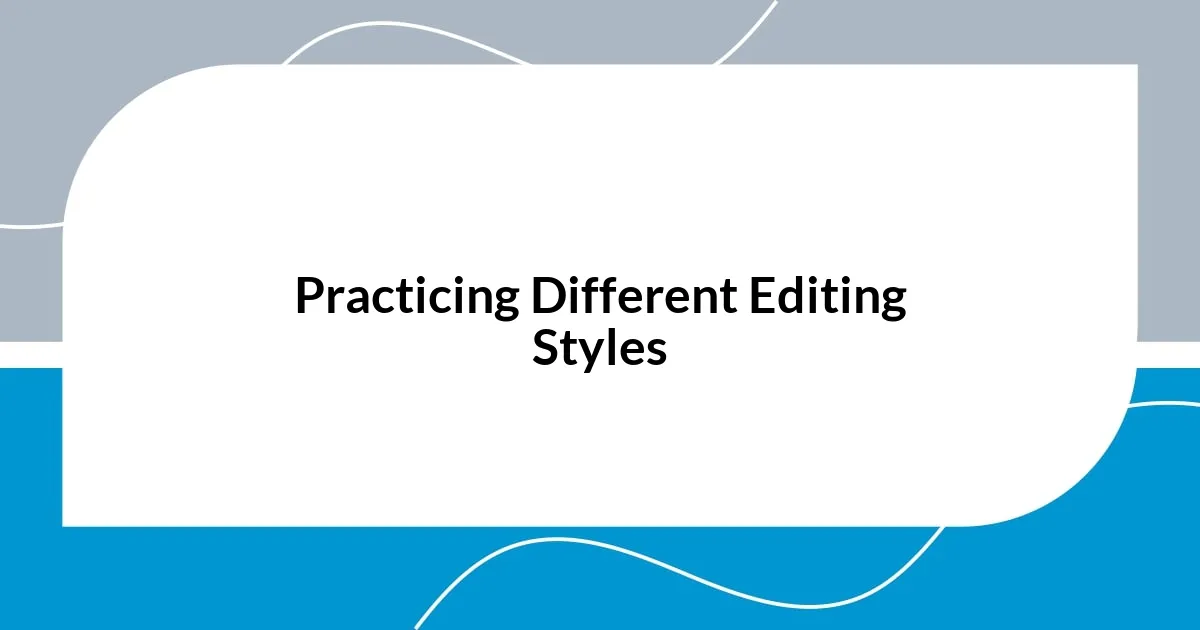
Practicing Different Editing Styles
Practicing different editing styles has been eye-opening for me. I vividly recall the first time I experimented with a minimalist approach—I stripped away unnecessary words and focused only on what mattered most in my writing. It felt liberating to see the essence of my message shine through without all the clutter. Have you ever tried writing this way? You might be surprised at how much clarity comes when you step back and let simplicity guide your edits.
I also ventured into the world of genre-specific editing styles, and this was a game-changer. While working on a fantasy short story, I quickly learned that the tone and pacing needed to be different compared to academic writing. I started honing my ability to create vivid imagery and bring characters to life. The emotional depth found in some passages surprised even me! This experience taught me that embracing a variety of styles not only sharpens my skills but also expands the emotional range of my writing. Have you explored editing with a focus on genre? It could radically shift the way you think about your work.
One truly memorable experience was my attempt at editing in the style of a famous author I admire. I chose Hemingway for his succinctness and directness. By rewriting some of my own paragraphs in his distinct voice, I found myself cutting out excess adjectives and opting for shorter sentences. The challenge was invigorating and taught me the value of precision in language. Each style I practiced added a new tool to my editing toolbox, making me a more versatile writer. What editing styles have you encountered that influenced your approach?
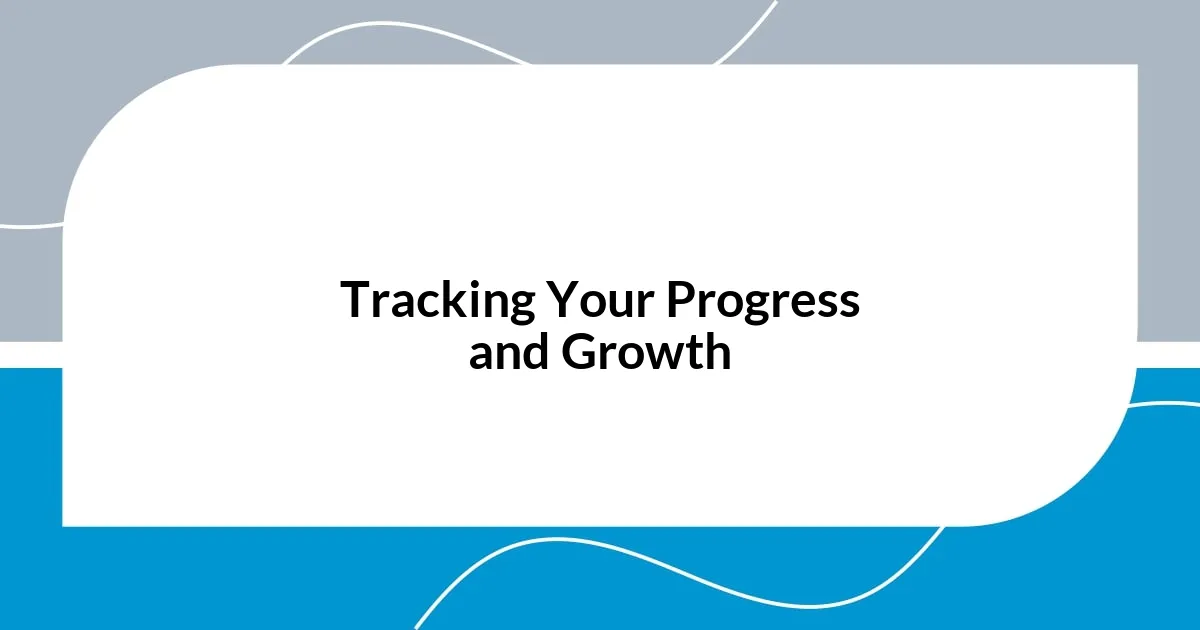
Tracking Your Progress and Growth
Tracking my progress and growth as an editor has been an eye-opening experience. I started by maintaining a simple journal, noting down not just the changes I made, but also my evolving thought process. One day, I stumbled upon an entry from six months earlier, and I couldn’t help but smile at how far I had come in recognizing my weaknesses. Have you ever revisited your past work and felt that sense of accomplishment? It’s a powerful motivator.
I made it a point to periodically review earlier drafts alongside my more recent ones. This reflection often sparked unexpected insights. For instance, I clearly remember comparing a piece I first submitted for critique with its latest revision. The difference in clarity and structure was striking. I thought, “Wow, I didn’t even realize how convoluted my initial writing had been!” Such moments of revelation not only reassure me of my progress but also encourage me to continue evolving.
Additionally, I became more intentional about setting specific goals for my editing practice. For example, I aimed to reduce unnecessary adverbs in my writing, tracking each time I succeeded. The satisfaction of achieving these small milestones was addictive. Have you set personal editing goals before? I found that not only did I improve my skills, but I also gained confidence in my editing choices, fueling a deeper commitment to my craft.